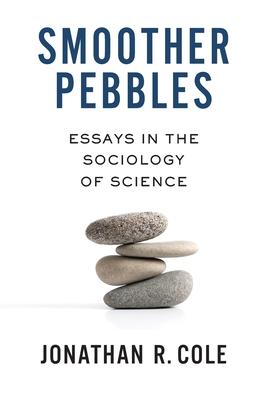Until the middle of the twentieth century, few thought of science as a social system, instead seeing scientific discovery as the work of individual geniuses. Columbia University’s Department of Sociology played a pivotal role in advancing the social study of science. Researchers of the "Columbia Program" analyzed how science works as a social institution, exploring its norms, values, and structure.
Smoother Pebbles presents a collection of essays authored or coauthored by Jonathan R. Cole, a leading Columbia Program figure, that trace the development and institutionalization of the sociology of science. Spanning from the 1960s to the 2020s and including both empirical and theoretical studies of science, the book is at once wide-ranging and united by core questions. Are scientists rewarded for the merits of their work or for other reasons? How does the system of social stratification in science operate? Has the funding of scientists been the result of an "old boys’ network"? How fair is the peer review process? In what ways does science fall short of its universalistic ideals? What factors have constrained opportunities for women in science? How has science fared amid attacks on academic freedom and free inquiry at universities? Cole’s introduction contextualizes both individual essays and the major concerns of the Columbia Program. Smoother Pebbles is essential reading for those interested in the growth and crucial questions of the sociology and social studies of science.| FindBook |
有 1 項符合
Smoother Pebbles: Essays in the Sociology of Science的圖書 |
 |
Smoother Pebbles: Essays in the Sociology of Science 作者:Cole 出版社:Columbia University Press 出版日期:2024-04-09 語言:英文 規格:平裝 / 696頁 / 普通級/ 初版 |
| 圖書館借閱 |
| 國家圖書館 | 全國圖書書目資訊網 | 國立公共資訊圖書館 | 電子書服務平台 | MetaCat 跨館整合查詢 |
| 臺北市立圖書館 | 新北市立圖書館 | 基隆市公共圖書館 | 桃園市立圖書館 | 新竹縣公共圖書館 |
| 苗栗縣立圖書館 | 臺中市立圖書館 | 彰化縣公共圖書館 | 南投縣文化局 | 雲林縣公共圖書館 |
| 嘉義縣圖書館 | 臺南市立圖書館 | 高雄市立圖書館 | 屏東縣公共圖書館 | 宜蘭縣公共圖書館 |
| 花蓮縣文化局 | 臺東縣文化處 |
|
|
圖書介紹 - 資料來源:博客來 評分:
圖書名稱:Smoother Pebbles: Essays in the Sociology of Science
內容簡介
作者簡介
Jonathan R. Cole is John Mitchell Mason Professor of the University at Columbia University, where he was provost and dean of faculties from 1989 to 2003. His scholarly work has focused on the development of the sociology of science and on the American research university. Cole is the author or editor of a dozen books, most recently Toward a More Perfect University (2016).
Somatic States: On Cartography, Geobodies, Bodily Integrity
Somatic States: On Cartography, Geobodies, Bodily Integrity
Brothers Behind Bars: A History of the Muslim Brotherhood from the Palestine War to Egypt’s Prisons
Reel Freedom: Black Film Culture in Early Twentieth-Century New York City
Reel Freedom: Black Film Culture in Early Twentieth-Century New York City
Political Geography: World-Economy, Nation-State and Locality
Between Families and Institutions: Mental Health and Biopolitical Paternalism in Contemporary China
Working-Class Raj: Colonialism and the Making of Class in British India
Ecological and Social Healing: Multicultural Women’s Voices
Ecological and Social Healing: Multicultural Women’s Voices
Somatic States: On Cartography, Geobodies, Bodily Integrity
Brothers Behind Bars: A History of the Muslim Brotherhood from the Palestine War to Egypt’s Prisons
Reel Freedom: Black Film Culture in Early Twentieth-Century New York City
Reel Freedom: Black Film Culture in Early Twentieth-Century New York City
Political Geography: World-Economy, Nation-State and Locality
Between Families and Institutions: Mental Health and Biopolitical Paternalism in Contemporary China
Working-Class Raj: Colonialism and the Making of Class in British India
Ecological and Social Healing: Multicultural Women’s Voices
Ecological and Social Healing: Multicultural Women’s Voices
|











